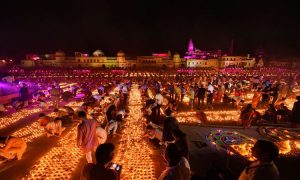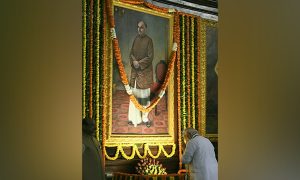
Sculpture of Yamuna by Mr Ram Sutar- the man behind the 182 Meter bronze statue of Sardar Patel
Yama in Rig Veda’s Yam –Yami Samwad (conversation), expresses and admits his parallel and differentiated sexuality and desires to his sister. And being Sister, Yami with whole lot of love accepts him as he is…
The last day of Diwali is dedicated to such acceptance of good, parallel, different thought process and diversity of the society.
Many a times in Puranas Yama’s Sister is described as Yamuna. The word Yama means twin or parallel. In Yamuna the name describes two aspects 1) Yama meaning twin 2) Una means minus. Meaning one who is twin but cannot be paralleled with anyone else in acceptance.
In later literature Yamuna is depicted as river. She is also known as Kalindi. She is always twined with the river Ganges. On one hand Ganges is symbol of purity while Yamuna is symbol of acceptance.
The Agni Purana describes Yamuna’s iconography. She is depicted as black in complexion and stands on her mount, the tortoise, holding a water pot in her hand.
The name Kalindi may be derived from her association as sister of Yama, the Lord of death and darkness as Kala (time).
The Vamana Purana narrates the tale how the originally clear waters turned black. Distraught by the death of his wife Sati, Shiva wandered the whole universe. The god of love Kamadeva shot Shiva with the arrow Unmadastra, that made Shiva restless and excited. Ever thinking of Sati, an excited Shiva jumped into Yamuna to overcome the sexual urge in his mad frenzy, turning her waters into black by his sorrow and unfulfilled desire. This story again underlines Yamuna’s behaviour of whole hearted acceptance of usually barred thoughts and alternate thinking.
On one hand where Ganga is one who washes away your sins, on the other hand Yamuna accepts you as you are.
In the modern days when we speak about Diversity and Inclusion, remembrance of Yamuna definitely will lead human to that society which will spread universal brotherhood no matter how diverse or different one may be from other.
I end this Diwali series with a verse from Maha Upanishad
अयं निजः परोवेति गणना लघुचेतसाम्। उदारचरितानां तु वसुधैव कुटुम्बकम।।
This is mine or that is his – thus is accounted by the petty-minded. But for ones with a glorious and high thinking life, the whole world itself is a family!
Author: Dr Sandeep Sadanand Chaugule, you may reach out to him on Twitter @sandipchaugulle




























 WhatsApp us
WhatsApp us